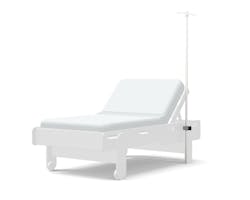The Architect and Design Industry Steps Up for Its Community During COVID-19
Photo: The HDPE hospital beds produced by Loll Designs are hygienic, easily cleanable and entirely recyclable. Credit: Loll Designs
Social distancing. I doubt many of us foresaw this phrase becoming one of the most popular so far in 2020. Due to COVID-19, social distancing has led to a significant round of changes in our daily routines, from the way we shop, socialize and eat, to work, parenting and more.
And while it’s meant to keep us physically apart, many of us are realizing that through this situation, we are finding ways to feel closer than ever.
Both people and companies are consistently showing acts of community support and are putting their creative skills to good use, such as sewing masks and donating needed equipment, to displaying colorful hearts in homes and shops and drawing chalk art on sidewalks and streets.
In the past month at interiors+sources, we’ve had dozens of these feel-good acts pass through our inboxes, each one just as thoughtful as the next, and highlighting how well the architecture and design industry steps up in tough times. Explore the different ways A&D firms and manufacturers are helping out their communities through the good deeds below.
Essential Equipment
Businesses all over the world are changing their production plans to make masks, shields, gowns and other necessary equipment for healthcare workers combatting coronavirus.
Loll Designs is one furniture manufacturer hoping to help by making hospital beds and other needed items from durable and sanitary HDPE (high density polyethylene). Primarily produced from reclaimed milk jugs, the material is hygienic, easily cleanable and entirely recyclable.
“We decided to create hospital beds because we want to help out,” says Gren Benson, Loll Designs’ co-founder and CEO. “We looked at all the PPE (personal protective equipment) that people on the front lines are asking for and it seems a lot are stepping up to produce the face masks. With our unique manufacturing ability, a field hospital bed is something we can do that the general public can't. The bed is ready to go. We have the design, material on hand, the machines and, most importantly, the people to do it.”
[Related: What Will Hotels and Conferences Look Like Post COVID-19?]
Volunteers from furnishing and lighting manufacturer Landscape Forms joined forces with fellow Kalamazoo, MI, company Stryker Corporation to also build emergency relief beds for medical facilities currently coping with the surge of coronavirus patients. Stryker is targeting the assembly of 10,000 emergency relief beds per week.
“I’m so proud of the generosity of team members to commit their time and expertise in this time of need,” says Tim Woolley, Landscape Forms’ vice president of Operations. “Especially since this team typically works either first or third shift. This means they’re not only dedicating their effort, they’re also turning their schedules—and their families’ schedules—upside down to fill that second shift.”
Many companies are looking to produce other needed items like gowns and masks, too. Chilewich has adapted part of its factory in Chatsworth, GA, to make vital protection equipment. The family-owned textiles company is now producing up to 25,000 isolation gowns per week alongside its flooring, wall textiles, upholstery fabric and window coverings.
Isolation gowns are used to protect healthcare workers and prevent contamination of clothing with body fluids and other potentially infectious material. This personal protective equipment is critical to mitigating the spread of COVID-19.
Made of a modified version of a waterproof backing used for Chilewich wall textiles, the gowns will be provided to front-line healthcare workers in partnership with Fabric Sources International (FSI) and a consortium of companies committed to addressing ongoing supply shortages.
Office furniture manufacturer Dauphin quickly pivoted to the production of face masks for health care facilities close to its northern New Jersey factory. Enlisting its automated fabric cutting capabilities and skilled sewers, Dauphin repurposed synthetic materials normally used to line fabric for its upholstered chairs and lounge furniture.
[Related: Healthy and Unique Office Renovations]
Photo: Office furniture manufacturer Dauphin is one of several companies that has quickly pivoted to the production of face masks. Credit: Dauphin
Wilkhahn is also sewing face masks at its headquarters in Germany in workspaces that would otherwise be devoted to upholstery in an effort to not only protect its employees, but also provide assistance to local organizations who are in dire need of them.
To make the masks, the Wilkhahn team uses a bonded nonwoven fabric that is normally applied inside upholstery covers for thermal comfort. The fabric is relatively close-knit, but is a breathable, food-safe and skin-friendly material that can be washed at 40 degrees C. To date, around 2,000 face masks have been produced alongside standard operations.
With cleanliness being a top priority, commercial plumbing manufacturer Sloan has provided its touch-free restroom products to support the conversion of Chicago’s renowned McCormick Place Convention Center and Yale University’s Payne Whitney Gym into temporary field hospitals, or COVID-19 Care Centers, due to the overflow of patients suffering from the virus.
With 500 beds in makeshift rooms, plumbing requirements at McCormick Place called for more than 200 Sloan sensor faucets in handwashing stations, and Sloan partnered with local customers to deliver the hygiene-friendly solutions.
Yale’s Payne Whitney Gym was also converted to a temporary field hospital and needed to retrofit its existing manual faucets and flushometers to provide a more sanitary environment for the influx of patients.
The facility removed its existing faucets and replaced them with Sloan sensor-operated faucets, while also installing new Sloan sensor flushometers to provide a touch-free experience.
Ultimately, these few examples of the numerous acts of support we’ve seen from the A&D community show that when we work together, we can maximize our potential for good.
Read next: Renovated Offices Show Health and Wellness Spaces are Here to Stay
About the Author

Adrian Schley
Associate Editor
Adrian Schley was an Associate Editor for i+s, where she covered the commercial interior design industry since 2018. Her work can also be found in BUILDINGS and Meetings Today.
